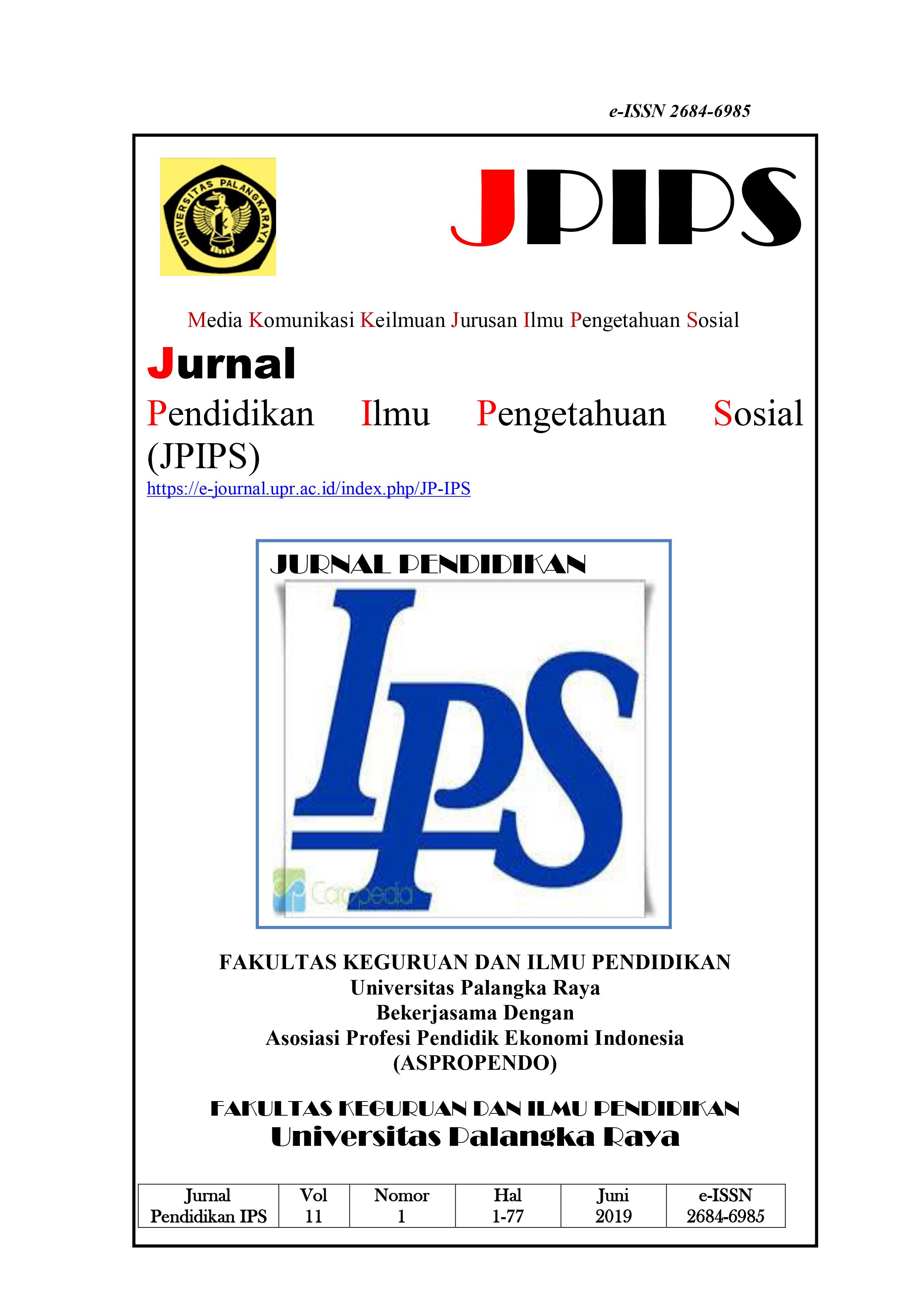The Role of Operant Conditioning in Enhaching Learning Outcomes in Social Studies Education
Keywords:
operant conditioning, reward and punishment, social studies subjects, studentAbstract
This research addresses the problem of students’ low interest in social studies, which is often perceived as overly theoretical, monotonous, and lacking relevance to everyday life. These perceptions contribute to low motivation and limited student participation during learning activities. The purpose of this study is to examine the effectiveness of integrating an operant conditioning approach into social studies learning to improve academic achievement. The study employed a quasi-experimental method with a pretest-posttest control group design, involving two junior high school classes. The experimental group received treatment through the application of reward and punishment strategies based on operant conditioning principles, while the control group underwent conventional instruction. Results showed a significant increase in academic achievement in the experimental group compared to the control group. These findings indicate that reinforcement-based learning can effectively enhance students' motivation and academic performance in social studies. The implication of this study highlights the value of incorporating psychological approaches into teaching strategies. Applying operant conditioning can help teachers create a more conducive and engaging learning environment, encouraging student participation and supporting better learning outcomes. Therefore, behaviorist strategies, particularly reinforcement, are recommended as a practical approach to address motivational issues in social studies education
Downloads
References
Abadi, D. P., Ramli, M., & Wahyuni, F. (2025). Analysis of Behaviorism Theory: Classical Conditioning and Operant Conditioning in Changing Students’ Truancy Behavior. Jurnal Pembelajaran, Bimbingan, Dan Pengelolaan Pendidikan, 5(2), 8. https://doi.org/10.17977/um065.v5.i2.2025.8
Ali, A., Maniboey, L. C., Megawati, R., Djarwo, C. F., & Listiano, H. (2024). Media Pembelajaran Interaktif : Teori Komprehensif dan Pengembangan Media Pembelajaran Interaktif di Sekolah Dasar. In PT. Sonpedia Publishing Indonesia.
Anggraini, F. P., Selamata, V., Rizky, A., & Safitri, S. (2025). Pendekatan Humanistik dalam Pembelajaran IPS: Memanusiakan Siswa dalam Proses Pendidikan. SOSIAL: Jurnal Ilmiah Pendidikan IPS, 3(2), 201–216. https://doi.org/10.62383/sosial.v3i2.790
Bonghawan, R. G. G., & Macalisang, D. S. (2024). Teachers’ Learning Reinforcement: Effects on Students’ Motivation, Self Efficacy and Academic Performance. International Journal of Scientific Research and Management (IJSRM), 12(02), 3218–3228. https://doi.org/10.18535/ijsrm/v12i02.el08
Dou, G., Guo, W., Kong, L., Sun, J., Guo, M., & Wen, S. (2024). Operant Conditioning Neuromorphic Circuit with Addictiveness and Time Memory for Automatic Learning. IEEE Transactions on Biomedical Circuits and Systems, 18(5), 1166–1177. https://doi.org/10.1109/TBCAS.2024.3388673
Franco, N., Chastre, C., & Biscaia, H. (2020). Strengthening RC Beams Using Stainless Steel Continuous Reinforcement Embedded at Ends. Journal of Structural Engineering, 146(5), 10–12. https://doi.org/10.1061/(ASCE)ST.1943-541X.0002606
Harahap, N. F., Pangaribuan, M., Faisal, M. H., Marbun, T., & Ivanna, J. (2023). Peran Pembelajaran IPS Dalam Pembentukan Karakter Siswa SMP 35 Medan. Journal Ability : Journal of Education and Social Analysis, 4(2), 157–166. https://doi.org/10.51178/jesa.v4i2.1354
Hasan, S.H. (1996). Pendidikan Ilmu-ilmu Sosial. In RinekaCipta.
Hu, J. (2024). Operant Conditioning in Child Psychology: Understanding the Influence of Rewards and Punishments on Childrens Behavior. Lecture Notes in Education Psychology and Public Media, 44(1), 259–265. https://doi.org/10.54254/2753-7048/44/20230161
Lestari, M. I., Sumartiningsih, S., & Suharini, E. (2024). Hambatan Dan Tantangan Pembelajaran Ilmu Pengetahuan Sosial Di Sekolah Dasar. Pendas : Jurnal Ilmiah Pendidikan Dasar, 09, 14. https://doi.org/10.23969/jp.v9i03.16114
Marsendi, F., Luthfiyah, G. S., Andriani, N. D., Aufi, R., & Lushinta, I. P. (2024). Menavigasi Relevansi Pendidikan IPS Di Era Disrupsi. Jurnal Pendidikan Ilmu Pengetahuan Sosial (JPIPS), 16(1), 74–84.
Maskuroh, L. (2023). Efektivitas Model Pembelajaran IPS dalam Meningkatkan Pemahaman Siswa tentang Dinamika Sosial, Kebijakan, dan Lingkungan di Sekolah Dasar. Jurnal Kependidikan, 11(1), 78–90. https://doi.org/10.24090/jk.v11i1.8357
Mea, F. (2024). PENINGKATAN EFEKTIVITAS PEMBELAJARAN MELALUI KREATIVITAS DAN INOVASI GURU DALAM MENCIPTAKAN KELAS YANG DINAMIS. Inculco Journal of Christian Education, 4(3), 252–275. https://doi.org/10.59404/ijce.v4i3.190
Meli, N. L. (2017). Penerapan Model Pembelajaran Inkuiri Terbimbing Untuk Meningkatkan Hasil Belajar Ipa Siswa Kelas V Sdit Raudhaturrahmah Pekanbaru. Journal of Education Action Research, 1(3), 220–229. https://doi.org/10.23887/jear.v1i3.12686
Naumira, N., Pebri, M., Bintang, S. A., Nasution, N. I., Alfiandi, M. H., & Yusnaldi, E. (2024). Efektivitas Strategi Pembelajaran IPS dalam Meningkatkan Pemahaman Kegiatan Ekonomi Siswa Sekolah Dasar: Studi Literatur. Journal Pendidikan Ilmu Pengetahuan Sosial, 16(2), 280–285. https://doi.org/10.37304/jpips.v16i2.17952
Oktari, S. T., Fitria, Y., & Amini, R. (2023). Pengaruh Model Pembelajaran Operant Conditioning Terhadap Hasil Belajar Matematika Kelas V Kurikulum Merdeka Belajar. Literasi: Jurnal Ilmiah Pendidikan Bahasa, Sastra Indonesia Dan Daerah, 5(1), 145–154. https://doi.org/10.23969/literasi.v13i2.8266
Prastiwi, D. P., Sundawa, D., & Muthaqin, D. I. (2024). Peran Reward Dan Punishment Dalam Meningkatkan Minat Belajar Siswa Pada Mata Pelajaran IPS Di Kelas VIII SMP Negeri 17 Bandung. Jurnal Ilmiah Wahana Pendidikan, 10(9), 103–113. https://doi.org/10.5281/zenodo.8172877
Ratnasari, D. H., & Nugraheni, N. (2024). Peningkatan Kualitas Pendidikan Di Indonesia Dalam Mewujudkan Program Sustainable Development Goals (Sdgs). Jurnal Citra Pendidikan, 4(2), 1652–1665. https://doi.org/10.38048/jcp.v4i2.3622
Sahir, S. H. (2021). Metodologi Penelitian. In KBM Indonesia.
Schumacker, R. E., & Holmes, L. F. (2022). Testing Individual vs Group Mean Differences in Social Science Research. General Linear Model Journal, 46(1), 43–50. https://doi.org/10.31523/glmj.046001.004
Shafiyaturrohmah, N., Nasehudin, & Hatami, W. (2024). Upaya Guru IPS Mengembangkan Aspek Afektif Di Kelas VII SMPN 1 Cilimus. Journal Pendidikan Ilmu Pengetahuan Sosial, 16(1), 48–58.
Skinner, B. F. (2013). Ilmu Pengetahuan dan Perilaku Manusia. In PUSTAKA PELAJAR.
Supardi. (2013). Aplikasi Statistika Dalam Penelitian. In Change Publication.
Suryani. (2023). Penerapan Metode Sosio Drama Untuk Meningkatkan Partisipasi Siswa Dalam Pembelajaran Sejarah Indonesia Pada Materi Peristiwa Sekitar Kemerdekaan Kelas XI IIS Sma Negeri 9 Malinau. LEARNING : Jurnal Inovasi Penelitian Pendidikan Dan Pembelajaran, 3(2), 173–181. https://doi.org/10.51878/learning.v3i2.2299
Wicaksono, P. N., & Purnomo, A. (2021). Analisis Model-Model Pembelajaran Yang Digunakan Oleh Guru Ips Di Smp Negeri Se-Kecamatan Sukorejo Kabupaten Kendal. Sosiolium: Jurnal Pembelajaran IPS, 3(1), 40–49. https://doi.org/10.15294/sosiolium.v3i1.45464














